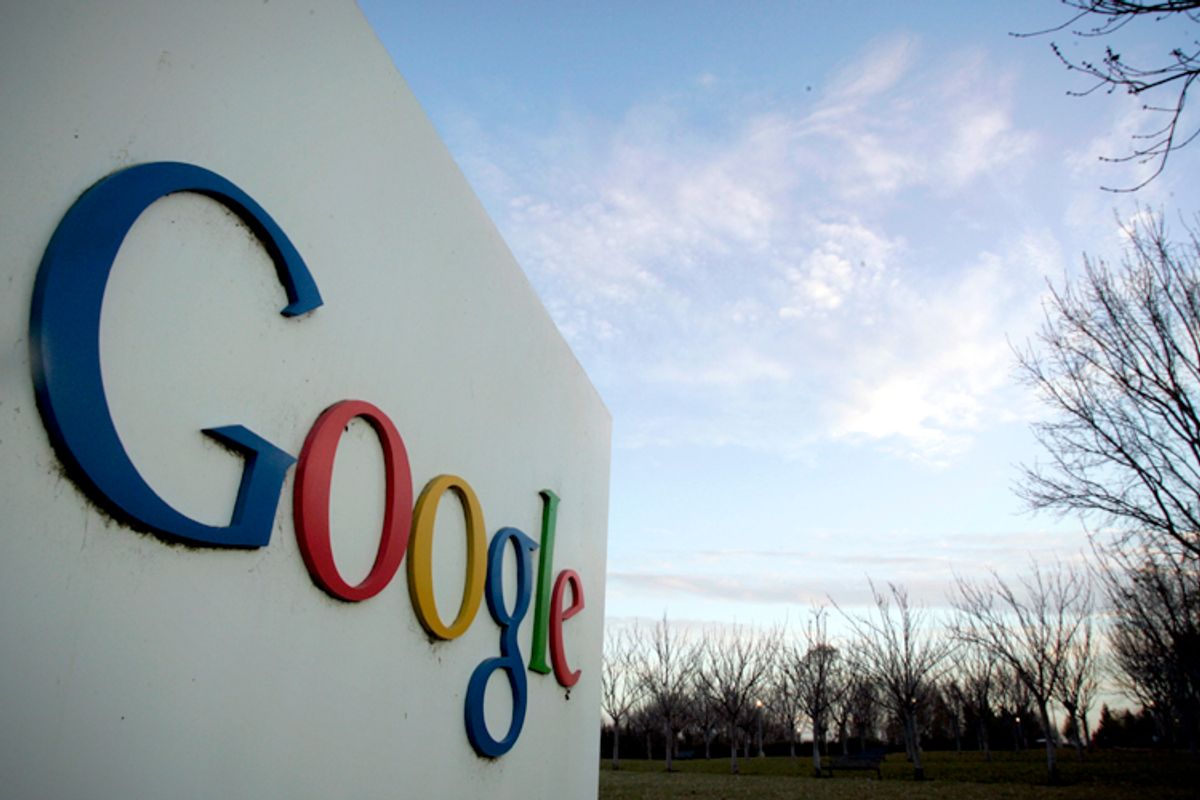On Wednesday, Google released a breakdown of the company's demographics. The results are sadly representative of the deplorable lack of diversity in Silicon Valley. In terms of gender, the company is 70 percent male and 30 percent female. In terms of ethnicity Google's makeup is 61 percent white, 30 percent Asian, 4 percent "two or more races," 3 percent Hispanic, 2 percent black and less than 1 percent "other." The full breakdown can bee seen in a graph here.
In 2013, the Bureau of Labor Statistics reported that overall, of those employed over 16 years of age, 47 percent were women, 11 percent were black or African-American, 5 percent were Asian and 15 percent were Hispanic, by comparison.
The company, like many other tech giants, was reluctant to share these numbers with the public, according to NPR. However, while the Google blog post, which accompanied these figures, was apologetic it was also rather tone-deaf.
"We’ve always been reluctant to publish numbers about the diversity of our workforce at Google. We now realize we were wrong, and that it’s time to be candid about the issues. Put simply, Google is not where we want to be when it comes to diversity, and it’s hard to address these kinds of challenges if you’re not prepared to discuss them openly, and with the facts."
This so-called candid statement about needing to do better, showed little self-awareness. Google, a nearly 16-year-old company, is just now deciding to publicly address this issue, and took no personal responsibility for its startling lack of diversity. Instead Google dismissed the "lots of reasons why technology companies like Google struggle to recruit and retain women and minorities," and passed the buck off to education. The statement read:
"For example, women earn roughly 18 percent of all computer science degrees in the United States. Blacks and Hispanics make up under 10 percent of U.S. college grads and collect fewer than 5 percent of degrees in CS majors, respectively. So we’ve invested a lot of time and energy in education."
Education, as Google pointed out, is no doubt a large slice of the problem. More women, blacks, Hispanics and others need to be encouraged to go into STEM-related fields (science, technology, engineering, mathematics). But the statement ignores underlying issues. STEM education also holds a Catch-22. Women and other minorities may not choose to study STEM or pursue a position in tech because they don't see themselves represented in the culture. All they see is white and male.
Companies can no longer believe in the Silicon Valley myth of meritocracy, which does more harm that help, allowing the tech culture to conveniently ignore inequality. Google must take some of the responsibility for being, as the company put it, "miles from where we want to be," in terms of diversity. The tech world must look outside of the white male mold.
Earlier in May, at the National Venture Capital Association's annual convention, Re/code's Kara Swisher and Singularity University vice president of research Vivek Wadhwa called companies out for laziness in their hiring practices. According to the Wall Street Journal:
"Ms. Swisher and Mr. Wadhwa both cited laziness as the main culprit for what they described as covert racism and sexism in the sector. People in positions of power, namely those funding companies and appointing board members, too often get comfortable with their immediate familiars and fail to take a wider view of talented people in the industry and world, they said."
Jesse Jackson Sr. has also recently taken up the diversity gap in corporate America -- specifically in tech. According to CNBC, Jackson took meetings this month with both Facebook and Google to discuss their lack of diversity.
Another issue, which has reared its ugly head many times in this year alone, is the ingrained "boys club" of the tech industry. Women in tech face a disturbing amount of both sexism and sexual harassment. Just this week Rap Genius' founder stepped down after making wildly inappropriate annotations of Isla Vista shooting suspect Elliot Rodger's manifesto, saying his sister must have been "smoking hot."
For Google, one of the largest and most recognizable tech companies, releasing this data is a step in the right direction for starting the diversity conversation, and hopefully the company makes more strides to solve it. However, it is disappointing that the company did not address other ways of rectifying the issue including changing hiring practices or attempting to create a more inclusive culture in Silicon Valley.

Shares